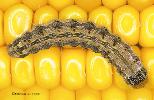July 20, 2010

Moth trap reports indicate an early start to the corn earworm infestation window across the Corn Belt this growing season. Agronomists for Syngenta Seeds have already identified corn earworm in the South, including Louisiana, Mississippi and Tennessee, and anticipate the trend could lead to significant corn earworm activity in the Midwest later in the 2010 growing season. Moth traps help identify geographies that are at a higher risk of corn yield loss due to possible insect infestation, so growers are urged to scout fields now to determine if treatments are needed to avoid yield-crippling damage.
Growers need to be vigilant about scouting corn for earworm
"Growers need to be vigilant about scouting for corn earworm. Scouting and applying insecticide can recover some yield loss when completed within critical timeframes, but unfortunately predicting when corn earworm will arrive is difficult," says Bruce Battles, agronomy marketing manager for Syngenta Seeds. "With the multipest control of the Agrisure Viptera 3111 trait stack, growers will be better able to manage this pest without worrying about scouting and spraying within these narrow timeframes." Beginning in 2011, growers will have the option of planting seed with the new Agrisure Viptera 3111 trait stack to protect against corn earworm damage without relying on time-consuming scouting and costly insecticide applications. The Agrisure Viptera 3111 trait stack maximizes yield potential by delivering unsurpassed, in-seed control of 14 yield- and quality-robbing insects, including this highly destructive pest. Improved insect control with the Agrisure Viptera 3111 trait stack also reduces the incidence of mycotoxin contamination from both aflatoxin and fumonosins, says Battles.
Corn earworm is one of the most destructive, yield robbing pests
Corn earworm is one of the most destructive members of the multipest complex, a collection of aboveground corn pests that can cause significant economic losses due to their abundant numbers and the destruction they can cause throughout the growing season. This persistent pest is not easily controlled by previous seed technologies and can affect yields and grain quality if left unchecked. Damage from corn earworm is caused by the larvae as they feed on leaves, silks and developing kernels. Battles says growers have become resigned to ear tip feeding by corn earworm larvae, opening the ear up to future problems with mycotoxins and molds. In 2008 yield trials, Syngenta research agronomists linked heavy corn earworm pressure to losses of up to 34 bushels per acre. While there are chemical applications available to help combat corn earworm infestations, the application window for such products is narrow and challenging to time correctly. As a result, growers still need to be diligent about monitoring fields for this pest to best minimize potential yield loss, disease susceptibility and grain quality damage. When pests such as corn earworm cause injury, it allows spores from the fungi to gain access, proliferate and produce mycotoxins.
New Agrisure trait stack delivers control of a number of insects
In addition to corn earworm, says Battles, the Agrisure Viptera 3111 trait stack delivers multipest control of black cutworm, Western bean cutworm, fall armyworm, dingy cutworm, common stalk borer and sugarcane borer. "The Agrisure Viptera trait, which powers the Agrisure Viptera 3111 trait stack, has the power to combat these pests and help U.S. corn growers recoup an estimated 238 million bushels of corn and $1.1 billion in annual yield and grain quality losses due to damage from these pests," he says. Growers in selected areas will have the opportunity to view hybrids with the Agrisure Viptera trait in action at Syngenta field trials in summer 2010. Agrisure Viptera technology is available in hybrids from the Syngenta seed brands--Garst, Golden Harvest and NK Seeds--and will also be made available through licensing agreements with other seed companies. For more information about the Agrisure Viptera trait and the Agrisure Viptera 3111 trait stack, visit www.agrisureviptera.com, or contact your local seed dealer or retailer.
You May Also Like




